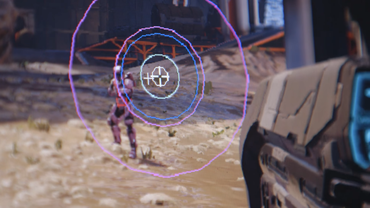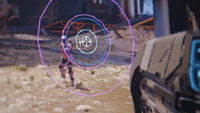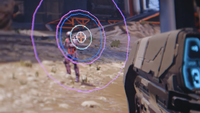Auto-aim: Difference between revisions
From Halopedia, the Halo wiki
m (Dab1001 moved page Aim assist to Auto-aim without leaving a redirect) |
No edit summary |
||
| Line 1: | Line 1: | ||
{{Status|Gameplay}} | {{Status|Gameplay}} | ||
{{Center|''"Bullet magnetism" redirects here. If you were looking for the related concept of camera magnetism, see [[magnetism]].''}} | {{Center|''"Bullet magnetism" redirects here. If you were looking for the related concept of camera magnetism, see [[magnetism]].''}} | ||
[[File:H5G Screenshot AimAssistDemo.png|thumb|right|370px|A debug view from [[The Sprint: Sustain]], showing how aim | [[File:H5G Screenshot AimAssistDemo.png|thumb|right|370px|A debug view from [[The Sprint: Sustain]], showing how auto-aim modifies the trajectory of the user's shots. The dark blue ring denotes the region where auto-aim begins to take effect, while the inner light blue-white ring shows the region where the shots will be directly on target.]] | ||
''' | '''Auto-aim''', also known as '''bullet magnetism''',{{Ref/Note|"Bullet magnetism" is the more common term for this type of [[aim assist]], but the term "auto-aim" is used here because it is how it is described within the game files of various ''Halo'' games.}} is a type of [[aim assist]] in place in the ''Halo'' video games, designed to make targeting enemy combatants easier for players. It slightly changes the trajectory of shots that the player fires, to direct them towards the enemy they are targeting. | ||
==Overview== | |||
Auto-aim works by subtly modifying the trajectory of bullets fired by the player, steering them in the direction of the enemy they are firing upon, if that enemy is close enough to the player's reticle. When the reticle is red, it indicates that auto-aim is fully engaged and the shots will be directed straight towards the enemy. However, auto-aim is often still active when the reticle is not red, steering the shots closer to the enemy - just not directly at them.{{Ref/YouTube|Id=SprintS3E4|WVQ4Bp7vlwc|Halo|The Sprint – Season 3 Ep. 4 “Sustain”|T=171}} | |||
The radius around the reticle at which auto-aim takes effect varies significantly depending on the weapon, with some weapons having significantly stronger auto-aim than others. Another factor that affects auto-aim strength is whether the player is zoomed in or hip firing - when zoomed, the angle at which auto-aim is applied becomes smaller, to account for the finer camera control the user has at that magnification level. Finally, the distance of the enemy from the player also impacts the strength of the auto-aim - beyond a certain distance, auto-aim will not kick in at all and the reticle will not turn red, leading to the notion of [[red reticle range]]. At these distances, the weapon becomes far less effective. | |||
Although useful, auto-aim does not guarantee that the shot will hit the targeted enemy, for multiple reasons. If the weapon's projectiles are slow-moving, the enemy may have time to anticipate the shot and dodge it. Additionally, [[spread|weapon spead]] is applied after auto-aim, so weapons with significant random spread or [[bloom]] may still miss a stationary target even when the reticle is red, if the spread happens to divert the shot away from the enemy. | |||
Combined with other forms of aim assist, auto-aim makes the task of aiming in a [[first-person shooter]] much easier, particularly for players using a controller. However, auto-aim still applies for players using other input methods such as mouse and keyboard, unlike some forms of aim assist like [[magnetism]]. | |||
==Gallery== | ==Gallery== | ||
<gallery> | <gallery> | ||
File:H5G Screenshot AimAssistDemo.png|A debug view in ''[[Halo 5: Guardians]]'', where aim | File:H5G Screenshot AimAssistDemo.png|A debug view in ''[[Halo 5: Guardians]]'', where auto-aim is partially engaged. The smaller white cross shows where the shot will be directed. | ||
File:H5G Screenshot AimAssistDemo2.png|The same debug view, but with the camera moved so that aim | File:H5G Screenshot AimAssistDemo2.png|The same debug view, but with the camera moved so that auto-aim is fully engaged, indicating the shot will be directed right towards the enemy. Note the red reticle. | ||
</gallery> | </gallery> | ||
==List of appearances== | |||
*''[[Halo: Combat Evolved]]'' {{1st}} | |||
*''[[Halo 2]]'' | |||
*''[[Halo 3]]'' | |||
*''[[Halo 3: ODST]]'' | |||
*''[[Halo: Reach]]'' | |||
*''[[Halo 4]]'' | |||
*''[[Halo 5: Guardians]]'' | |||
*''[[Halo Online]]'' | |||
*''[[Halo Infinite]]'' | |||
==Notes== | |||
{{Ref/Notes}} | |||
==Sources== | ==Sources== | ||
Revision as of 23:16, August 10, 2021

Auto-aim, also known as bullet magnetism,[Note 1] is a type of aim assist in place in the Halo video games, designed to make targeting enemy combatants easier for players. It slightly changes the trajectory of shots that the player fires, to direct them towards the enemy they are targeting.
Overview
Auto-aim works by subtly modifying the trajectory of bullets fired by the player, steering them in the direction of the enemy they are firing upon, if that enemy is close enough to the player's reticle. When the reticle is red, it indicates that auto-aim is fully engaged and the shots will be directed straight towards the enemy. However, auto-aim is often still active when the reticle is not red, steering the shots closer to the enemy - just not directly at them.[1]
The radius around the reticle at which auto-aim takes effect varies significantly depending on the weapon, with some weapons having significantly stronger auto-aim than others. Another factor that affects auto-aim strength is whether the player is zoomed in or hip firing - when zoomed, the angle at which auto-aim is applied becomes smaller, to account for the finer camera control the user has at that magnification level. Finally, the distance of the enemy from the player also impacts the strength of the auto-aim - beyond a certain distance, auto-aim will not kick in at all and the reticle will not turn red, leading to the notion of red reticle range. At these distances, the weapon becomes far less effective.
Although useful, auto-aim does not guarantee that the shot will hit the targeted enemy, for multiple reasons. If the weapon's projectiles are slow-moving, the enemy may have time to anticipate the shot and dodge it. Additionally, weapon spead is applied after auto-aim, so weapons with significant random spread or bloom may still miss a stationary target even when the reticle is red, if the spread happens to divert the shot away from the enemy.
Combined with other forms of aim assist, auto-aim makes the task of aiming in a first-person shooter much easier, particularly for players using a controller. However, auto-aim still applies for players using other input methods such as mouse and keyboard, unlike some forms of aim assist like magnetism.
Gallery
A debug view in Halo 5: Guardians, where auto-aim is partially engaged. The smaller white cross shows where the shot will be directed.
List of appearances
- Halo: Combat Evolved (First appearance)
- Halo 2
- Halo 3
- Halo 3: ODST
- Halo: Reach
- Halo 4
- Halo 5: Guardians
- Halo Online
- Halo Infinite
Notes
- ^ "Bullet magnetism" is the more common term for this type of aim assist, but the term "auto-aim" is used here because it is how it is described within the game files of various Halo games.

